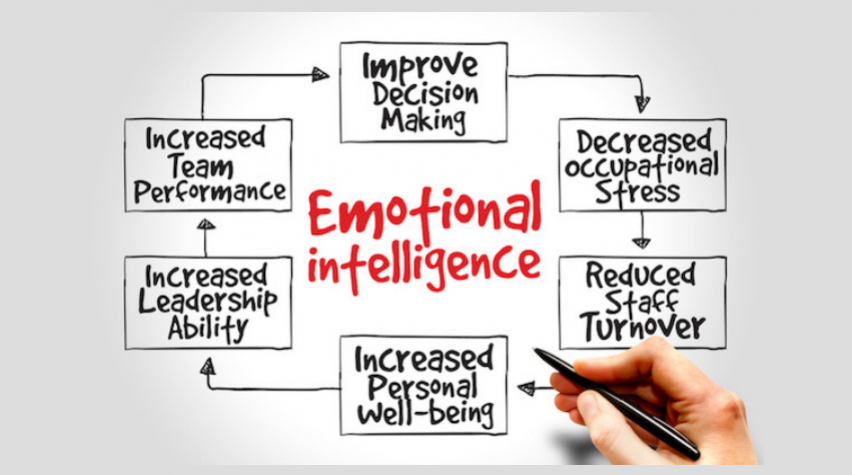
Emotional intelligence is the ability to understand your emotions and the emotions of others. Emotions are expressions of core feelings, including happiness, sadness, anger, fear, and shame (1). Everyone displays one or more of these emotions during the course of a day. Being able to perceive and interpret these feelings in yourself and others is an important skill that can set you up for success in your professional career and personal life. Studies have shown that over 80% of people with high emotional intelligence are high performers (1). Yet, this is not a skill taught in school. Graduates enter the workforce without a formal understanding of the concept of emotional intelligence. Follow these guidelines to help improve and enhance this vital skill.
Understand and manage yourself
Many of us work in teams on several projects simultaneously. Team members need to understand one another to be efficient collectively. The first step is to understand yourself. How can you understand others if you don’t understand yourself?
The key to understanding yourself is to develop a keen sense of self-awareness and self-management. The ability to recognize your own emotions in the moment can help you to control and direct your behavior positively (1).
For example, imagine you need to leave your family for a work assignment at a remote site to test a new system. Upon arrival, the system is not nearly ready for testing. You start to breathe heavily and get visibly upset; eventually, you yell profanities at the vendor responsible for providing the completed product and leave the site. Let’s look at this scenario objectively: You did not practice self-awareness or manage your emotions and behavior. Although the incomplete status of the system was unacceptable, creating a scene and leaving the site made no progress toward fixing the issue. From a business standpoint, there is also an opportunity cost associated with such an action.
This same scenario could be handled differently with proper self-awareness and self-management. When you arrive at the site and find the system deficiencies, you are not happy deep inside but you recognize your emotions. Instead of losing your cool, you clearly present the deficiencies to the vendor. Then you and the vendor, collectively, agree on a path forward and a deadline to complete the test.
This example illustrates how powerful and useful emotional intelligence can be in daily interactions. Use the following strategies to improve your self-awareness and self-management:
- Spot your emotions in books, movies, and music. Watch, listen, and observe interactions around you to practice perceiving and interpreting others’ emotions.
- Feel your emotions physically. Be aware of the physical changes your body undergoes as your emotions change (e.g., shaking and trembling when you feel fearful).
- Learn how to calm down. Once you can feel your emotions physically, you can control your bodily response by taking deep breaths or using other calming mechanisms.
- Sleep on it. Taking time before you react can help you to avoid knee-jerk reactions that you may regret later.
Understand and manage others
Once you are able to sense and manage your own emotions, you can work to understand and manage the emotions of others. The ability to accurately perceive emotions in others (i.e., social awareness and relationship management) can help you to manage interactions successfully (1). This may require listening and observing carefully. We spend, on average, half of our typical business day listening (2). This presents ample opportunities to improve emotional intelligence.
Consider the previous example and how social awareness and relationship management could help improve the outcome. After arriving at the site and realizing that the system cannot be tested, you seek to understand what went wrong and show a degree of empathy to the vendor working to fix the issue. This makes the vendor and other team members feel less defensive and more willing to work collaboratively and identify a solution. Use these social awareness and relationship management strategies to expand your ability to understand and manage others:
- Practice the art of listening. You have to listen to understand others. This requires tuning out the voice in your head and listening actively to the speaker. The CEP article “Listen Up!” (2) offers tips for becoming a better listener.
- Accept feedback. To understand the effect you have on other people, you need to be open to feedback.
- Only get mad on purpose. Maintaining your cool in critical moments helps get you what you want, rather than getting in your own way.
- Explain your decisions, don’t just make them. Explaining yourself to others creates a connection and helps them to understand your perspective and rationale.
Put your emotional intelligence to work
Professional interactions range from one-on-one meetings, such as performance evaluations, to multidisciplinary group gatherings, such as process hazard analyses (PHAs). In each of these situations, successful interactions drive progress and deliver results. Practice and apply emotional intelligence to improve both your professional and personal interactions.
- Bradberry, T., and J. Greaves, “Emotional Intelligence 2.0,” TalentSmart, Inc., San Diego, CA (2009).
- Smith, B. D., and N. Bishop, “Listen Up!,” Chemical Engineering Progress,113 (12), pp 43–46 (Dec. 2017).
This article originally appeared in the Young Professionals Point of View (YPOV) column in the September 2018 issue of CEP. Members have access online to complete issues, including a vast, searchable archive of back-issues found at aiche.org/cep.

